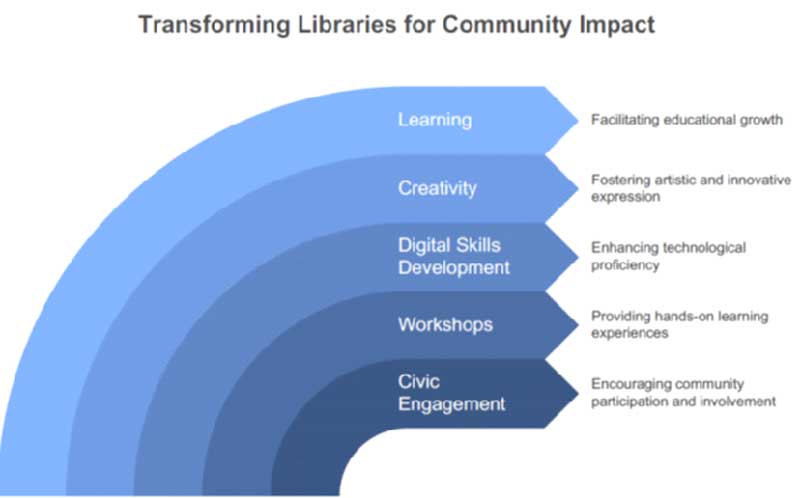The library is where knowledge meets minds. Society and the school system in Pakistan are worried about the declining reading culture. Libraries, once essential centers of knowledge, have now become empty spaces, more like cemeteries than learning centers. This decline is due to inadequate funding, outdated infrastructure, and lack of resources. Libraries play a vital role in fostering social interaction, creativity, and critical thinking. However, many in Pakistan cannot meet modern users’ needs because they lack digital archives, proper cataloging systems, and basic infrastructure.
With the rapid advancement of technology, it is easy to underestimate the usefulness of libraries. Nonetheless, these establishments still play a vital role in promoting social interaction, creativity, and critical thinking in addition to reading. Libraries are repositories of shared knowledge and cultural history, not merely books or treatises.
On the other hand, Pakistan’s deteriorating reading habits are reflected in the state of its public libraries today. Many of these institutions, which were once significant centers of discussion and learning, are now in pitiful shape due to a lack of funding, outdated infrastructure, and a lack of means to preserve their historical value. This situation exacerbates the lack of intellectual growth and limited access to information for many people, and it is particularly bad in smaller towns and cities.
In addition to being information hubs, libraries should be thriving hubs for communication that offer spaces for ideas to freely circulate and creativity to thrive. However, many libraries in Pakistan fall short of meeting the expectations of modern readers. Due to their lack of digital archives, suitable cataloging systems, and basic infrastructure, these libraries offer an experience that deters rather than promotes participation.

In addition, new distractions brought forth by the digital age are leading many young people away from reading. To combat this, our libraries must be modernized and renovated to appeal to today’s young and upcoming generations.
Reviving libraries should lie with the corresponding education departments. Libraries must be recognized as essential public institutions that merit ongoing support, upkeep, and innovation. To revitalize the reading culture and transform these neglected spaces into vibrant educational hubs, a few essential steps must be made.
Above all, the government must allocate adequate finances for the repair of libraries, the growth of book collections, and developing digital infrastructure. Libraries should also evolve into hybrid spaces, integrating traditional books with digital resources such as e-books, online journals, and digital literacy programs. These initiatives will modernize and enhance the library experience.
There are several innovative library models around the world that Pakistan might use. One such example is the, BiblioTech in San Antonio, Texas, nation’s first fully digital public library. The younger, more tech-savvy populace finds BiblioTech particularly intriguing, as it offers thousands of e-books and other digital materials. This idea might be replicated in Pakistan, where large portions of the youth are more accustomed to digital media than physical literature. Another excellent example is the Dokk1 Library in Aarhus, Denmark. Dokk1 is a multifunctional location that houses books as well as public events, workshops, and gaming areas. By bringing people together for creative and educational pursuits, it serves as a communal hub that fosters an active culture.
A well-known, the Oodi Library in Helsinki, Finland, is another shining example. Oodi goes beyond being a mere repository of books; it serves as a center for civic engagement, hosting various workshops, training sessions, and programs to develop digital skills. Such innovative ideas can be adapted in Pakistan to create libraries that go beyond traditional functions, offering spaces for creativity, learning, and community building. There are more than 307 public and private libraries in Pakistan which if not properly cared will be equal to the closure of information centers and that indeed would be an irrecoverable loss to the national intellectual exchequer.
Additionally, creative and engaging programming can enhance the vibrancy of Pakistani libraries. To attract readers, libraries must offer more than just books. Events like book clubs, literary festivals, storytelling sessions, and author meet-and-greets may make libraries interesting places to visit. Collaborating with universities and colleges on joint projects can also inspire young minds. Libraries should be lively places where knowledge is valued through interaction and discussion. In addition to helping those who might not have easy access to physical libraries, offering e-book lending services and other digital access through applications and online platforms will enhance the library experience even more.
Involving the community is another essential element in reviving Pakistan’s libraries. Libraries should become social gathering places where residents feel engaged and invested. Through student leadership initiatives, reading campaigns, and volunteer programs, libraries can improve their engagement with their communities. By involving the public, libraries can regain their status as vital parts of the social and intellectual fabric.
Our libraries have historically been essential to the sharing and preservation of Pakistan’s rich literary legacy. From the poetry of Allama Iqbal to the prose of Saadat Hasan Manto, our literary legacy is vast and invaluable. But the decay of our libraries speaks to a broader societal detachment from this past. Reclaiming our reading culture requires more than just updating libraries; it also calls for a cultural shift toward valuing knowledge, literature, and intellectual growth. Educational institutions ought to lead this revival by encouraging library visits and cultivating a love of reading in kids from an early age. In addition to ensuring that books are read, parents must foster a reading culture in their homes.
Revitalizing Pakistan’s libraries is crucial for preserving both literary heritage and our nation’s intellectual life. By putting worldwide best practices into practice, increasing government support, and fostering a culture of community participation, libraries can be transferred into thriving centers of information and interaction. The future of our society hinges on our capacity to create settings in which knowledge is respected, curiosity is nurtured, and the written word continues to inspire and educate future generations. Together, we can rejuvenate our libraries and in doing so, enrich our intellectual landscape. The Higher Education Commission should explore this issue by instituting a mandatory internship program for recent graduates to establish a culture of reading from the ground up.





